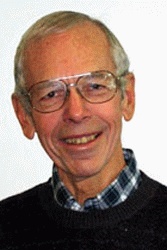You'd think that after taking the ferry from Bellingham to Haines for the first time, I'd be left with images of whales and bald eagles and dolphins as dominant recollections of the trip. And, to a large extent, that's true. But there's one other image, not so inspiring and benign, that persists.
Let me set the scene. Our daughter, Gillian, a first-grade teacher in an inner-city (a euphemism I've grown to hate) school, and I felt exercise-deprived on the M/V Malaspina, so we conned ourselves into thinking that walking briskly around the deck numerous times would give us at least a maintenance-level workout. During our rounds, we became familiar with a group of our fellow passengers, chatting briefly with some, smiling at others. One family, with whom we had not even superficial contact, began to claim more of our attention.
This family, composed of a young father, a younger-looking mother and a cherubic child of perhaps eight months, attracted increasing portions of our awareness. The reason stemmed, not from their actions, but rather from what they didn't do. The father and mother rarely spoke to each other; to the baby, during the many times we saw them, they spoke not at all. The youngster was held secure in a child carrier, always strapped to the back of one of his elders. When we passed him, Gillian and I would wave, hoping for some response. He'd follow us with his eyes, but displayed no emotion.
 |
| Mort Maimon |
|
In her five years as a teacher, Gillian has become fiercely devoted to the welfare of children, particularly those growing up without the advantages we'd like all kids to have. One thing she's noted on occasion is that the effects of poverty can be softened if a family loves its young and makes deliberate efforts to communicate with them regularly. Failure to communicate, in her way of thinking, constitutes intellectual and emotional abuse.
So, there we were, deluged with stimuli amazing to behold, chattering away with, "Didja see…?" and "How about that?" Most people on the ferry were talkative, telling their stories of what they'd seen and felt. And throughout our experiences, we were aware of the cherub, every second journeying imperceptibly toward the adult he would become, deprived of adult intermediaries who could help him make sense of the world unfolding before him.
To allay our irritation, we told ourselves that what was happening — or rather, what wasn't happening — was none of our business, but we knew better than that. John Donne's "No man is an island entire of himself" had it right. But what should we have done? We weren't, after all, the parenting police. So, we stewed and did nothing.
What does it take for all parents to understand the value of interacting regularly with kids — reading, talking, showing, encouraging responses? What does it take for them to realize that doing so is critical to sound intellectual and emotional development?
I wish I knew the answers to those questions, especially since the last person we saw as we disembarked was that beautiful little kid, looking out impassively at an unfamiliar world, imprisoned in a child carrier, as well as in a world of silence.




